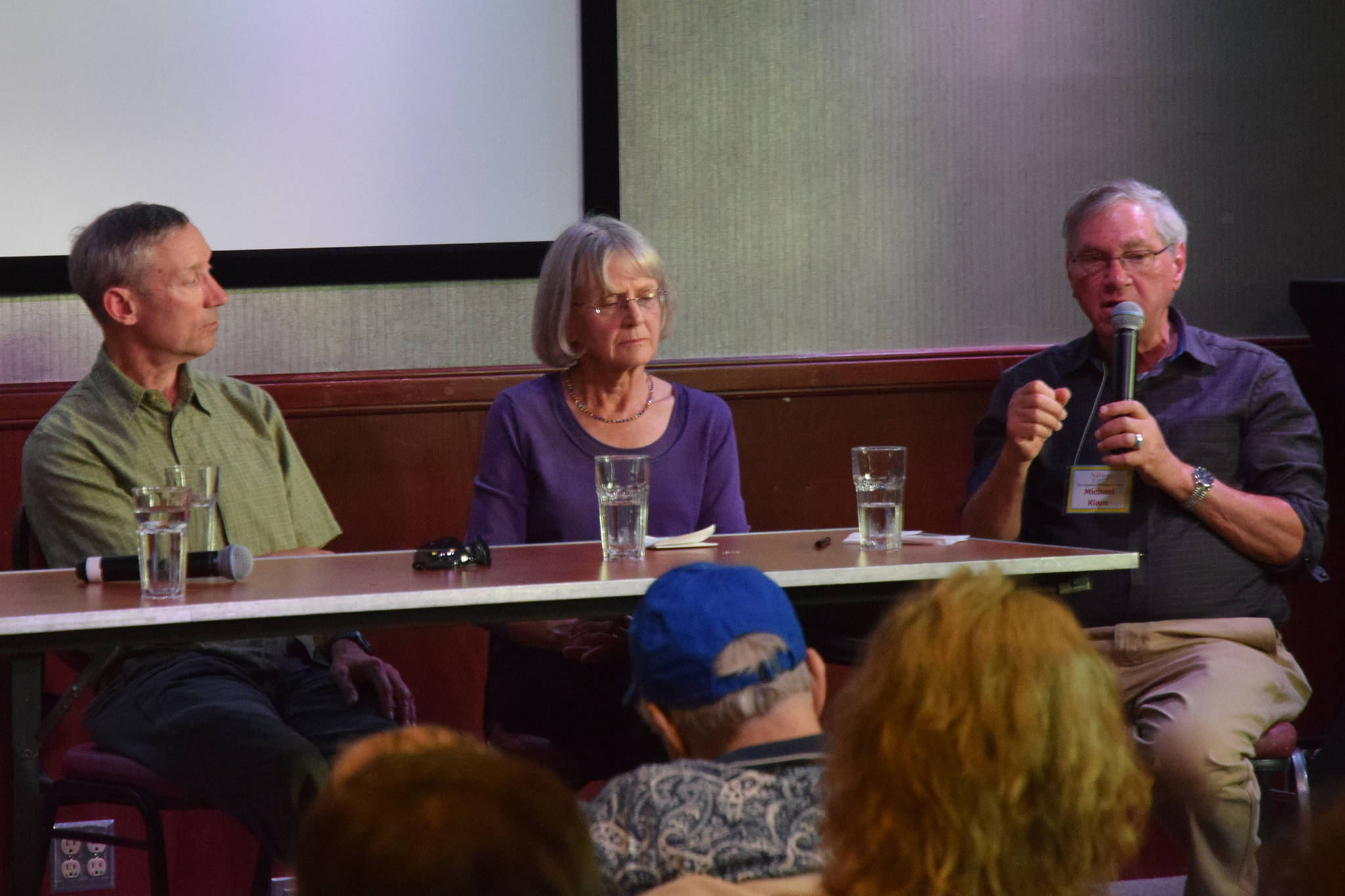Seeing the effects of climate change on Alaska first hand — its melting glaciers and receding shorelines — can serve as a visceral reminder for what’s at stake for a state warming twice as fast as the global average.
But discussing a dire climate outlook isn’t always part of the on-shore program for cruisers to the 49th state.
Not so for a group visiting Juneau on Monday. The Nation Magazine’s 21st Annual Seminar Cruise stopped in Juneau on Monday. The politically progressive outlet held a climate change panel discussion with correspondents and members of local climate action group @ 350 Juneau.
The Last Frontier is on the ‘front lines’ of climate change, said John Nichols, a national affairs correspondent for The Nation who’s reported from Alaska.
“We have a state in our country that is threatened by something that we all talk about. They (Alaskans) are living it,” Nichols said.
About 300 attended the cruise on Holland America Line’s Eurodam this week. Two correspondents from the magazine and its editor and publisher, Katrina vanden Heuvel, joined @350 co-chair Doug Woodby and steering committee member Gretchen Keiser for a discussion of climate issues facing Alaska.
The cruises have a loyal following. Many cruisers have attended multiple The Nation cruises, and greeted one another by name in the ballroom. Onboard the Eurodam, they held seminars on national defense issues and the future of the Arctic. The cruise also stopped in Juneau in 2007.
“I would not be on a cruise,” if the nation wasn’t doing it, said cruiser Ann Martin.
The cruises are a big part of sustaining the magazine financially, said vanden Heuval. But they also invigorate the network of readers who support it. It’s a trend that’s caught on with the publishing industry. The New York Times offers “Foreign Affairs Afloat at Cherry Blossom Time in Japan” and an “Antarctica and Climate Change” cruise.
The trips have given rise to hand-wringing among media watchers. To understand the world, travelers often have to see it. Getting there means burning fossil fuels.
Vanden Heuval acknowledged that there’s a tension between travel and climate change, but said it’s important for her that travelers take back what they see and learn in Alaska to their hometowns, she said.
“There is an irony, a tension, but the cruise is the largest supporter of our journalism. Our journalism tries to move people to activism, to inform people and to get them to think hard about what they can do,” vanden Heuval said.
Defense correspondent Michael T. Klare agreed.
“I think the cruise can educate people in a way that they never would have before to learn about Alaska’s environmental problems,” Klare said.
The Empire sat down with three cruisers after the seminar. They echoed Klare and vanden Heuval’s sentiments: the fossil fuels expended during travel can be worth it — if a traveler is determined to make a difference with what they learn on the journey.
“The good that comes outweighs the fuels we’re expending,” cruiser Ann Martin said.
Libby Carr, a financial adviser Washington state, said she’s putting immigration activist friends she’s met on the cruise in touch with immigration attorneys she knows.
The trip is full of real “movers and shakers” in progressive politics, she said.
Retired Seattle couple Ann and H. Tony Martin, both on their fourth The Nation cruise, said they sometimes buy additional carbon offset options offered when they travel, though they lamented they couldn’t do so on the Holland America cruise.
During their day in Juneau, the Martins walked around downtown, visiting the state capital, the Juneau-Douglas City Museum and the whale sculpture on the Downtown Seawalk.
The Martins make an effort in their Seattle home to leave a small carbon footprint. Solar panels help them use about 90 percent renewable energy. It’s a trade off they’re happy to make to help balance out the fossil fuels they burn while traveling.
“We change how we use energy to have a good standard of living,” Ann Martin said.
• Contact reporter Kevin Gullufsen at 523-2228 and kgullufsen@juneauempire.com. Follow him on Twitter at @KevinGullufsen.

